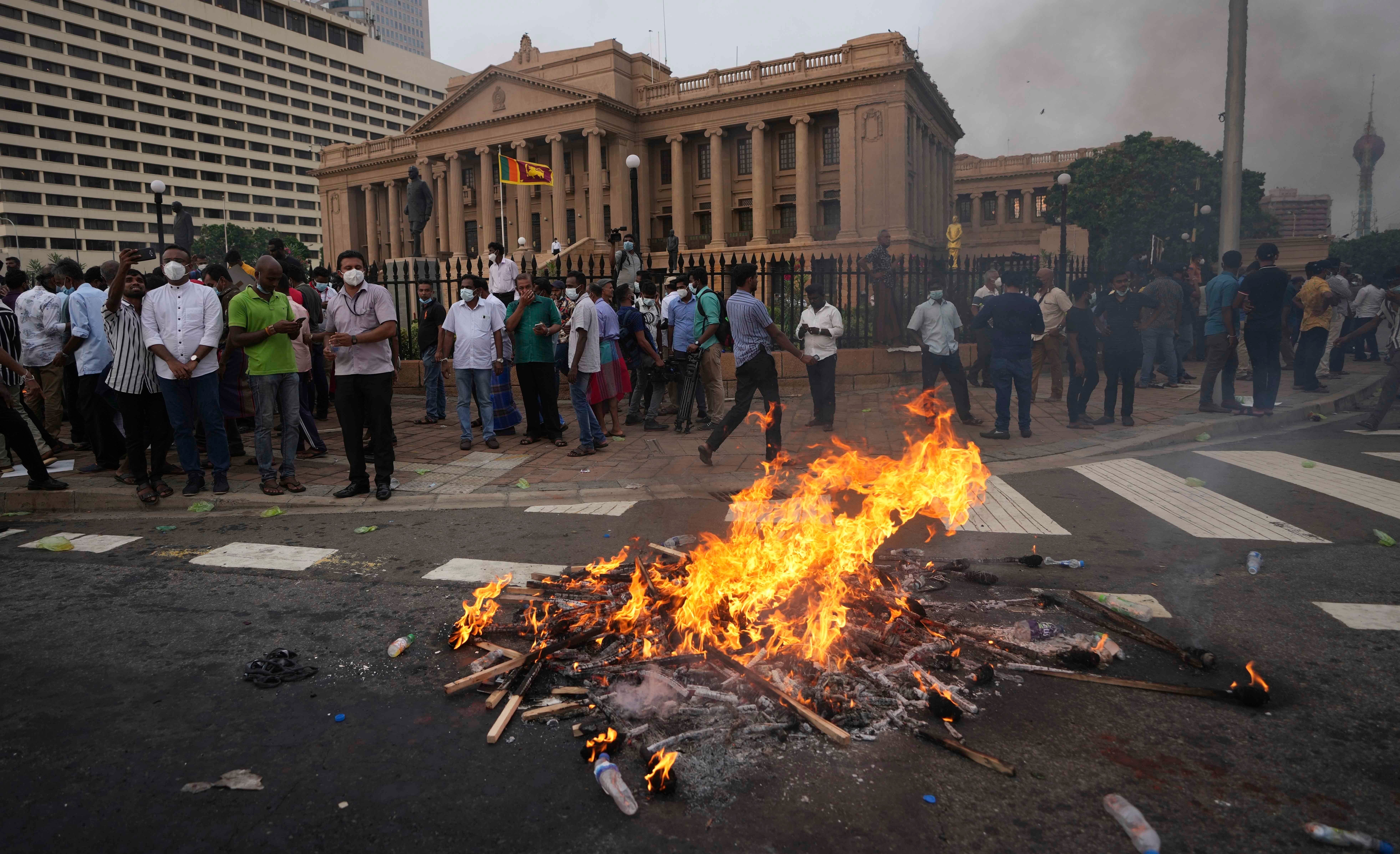Ranil Wickremesinghe: Can veteran’s appointment as Sri Lanka’s new PM stave off more protests?
‘They need to dissolve the government and call for fresh elections,’ says one protester

Veteran opposition leader Ranil Wickremesinghe was sworn in as the prime minister of Sri Lanka on Thursday as protests against the president rage across the country amid a crippling economic crisis.
Mr Wickremesinghe, 73, who lost the parliamentary elections in 2020 took over the prime minister’s office for the sixth time after Mahinda Rajapaksa resigned from the post earlier this week when anti-government protests turned violent. Mr Rajapaksa, his son, Namal, and 15 allies were barred from leaving the country by a court order.
Since April, thousands of Sri Lankans have assembled at Galle Face, one of the country’s swankiest areas in the capital Colombo, to demand the resignation of President Gotabaya Rajapaksa for his mishandling of the economic crisis.
Parched foreign reserves have forced the locals to suffer food and fuel shortages, soaring prices of essential commodities and long hours of electricity blackouts.
The president has refused to step down from power.
The island nation is on the verge of bankruptcy after suspending payment of $7bn (£5.7bn) of foreign loans it was due to pay this year out of $25bn (£20.4bn) due by 2026. Sri Lanka’s total foreign debt stands at $51bn (£41.7bn).
Mr Wickremesinghe, a lawmaker for 43 years – who has held the prime minister’s post during some dark times, including the 2019 Easter bombings which killed at least 250 people – faces a herculean task of bringing stability to the country.
Critics have questioned his appointment – he is the lone member of the United National Party (UNP) in parliament and is known to be close to the Rajapaksa family.
A Rajapaksa-led alliance has the majority in parliament with 100 of 225 seats, while the opposition has 58. The rest are independent.
Although Mr Wickremesinghe is expected to form a unity government, opposition parties have refused to accept ministerial berths, strengthening calls for the president’s resignation.
The protests, which were largely peaceful, turned violent on Monday after demonstrators were attacked by pro-government supporters, prompting a retaliation from the livid protesters.
Nine people, including a lawmaker and two police officers, have been killed, while more than 200 people sustained injuries in the carnage.

Following Monday’s violence, Sri Lankan authorities on Wednesday deployed military and armoured vehicles on the streets of the capital, a day after the defence ministry ordered the armed forces to shoot at anyone damaging public property or threatening lives.
Despite the clampdown, protesters have not stopped their attempts to bring down the president. Some of the prominent faces from the protest have taken to Facebook to mobilise people and asked them to refrain from indulging in violence.
“No matter who becomes the prime minister, it is Gotabaya we want to see gone. He should run the way his brother did. My country does not deserve to live a life of misery. We will not rest till the president resigns,” Sajith Lakshan, a college student who had been visiting the protest site for more than 15 days, told The Independent.
Another protester, 23, who did not want to be identified said that Mr Wickremesinghe’s appointment makes no difference as he will work under the president’s instructions.
“They need to dissolve the government and call for fresh elections,” she said.

The newly-appointed prime minister on Thursday assured the demonstrators that neither he nor the police would interfere with the ‘Gota Go Home’ protests at Gall Face.
N Sathiya Moorthy, a policy analyst and commentator based in the Indian city of Chennai, said that Mr Wickremesinghe cannot give the commitment as he does not have the authority.
“Wickremesinghe right now is the best man for the job but he doesn’t carry a parliamentary majority. Efficiency by itself doesn’t speak for popularity and vice-versa. He depends entirely on the president for parliamentary support,” he told The Independent.
He added that Mr Wickremesinghe is the new public face of Sri Lanka to the west and his introduction might help with the flow of funds into the country.
“He [Mr Wickremesinghe] is not a great economist by any stretch of imagination but given the crisis he has to take care of the economy,” Mr Moorthy said.
“We are facing a crisis and we need to get out of it. I have taken on the challenge of uplifting the economy and I must fulfil it,” the prime minister told reporters on Thursday.
When asked how would he form a majority given he’s the lone member of the party, Mr Wickremesinghe shot back at a British journalist before comparing himself with Winston Churchill. “Churchill had only four members backing him in 1939. How did he become the PM? Because of the crisis. I have done the same,” he said.
Born into an affluent family, Mr Wickremesinghe, a lawyer by profession, was first elected to parliament in 1977. He served his first tenure as the prime minister between 1993-94 and was elected as the leader of the UNP in 1994.
India was the first country to reach out to Mr Wickremesinghe as it battles China for influence in the strategically important region. He met India’s high commissioner in Colombo in his first publicly known contact with a foreign government since his latest appointment.
“Discussed continued cooperation for economic recovery and stability in Sri Lanka through democratic processes,” the Indian high commission in Colombo said in a tweet.
Earlier this week, India, assuring its support to Sri Lanka, claimed it had extended support of $3.5bn (£2.9bn) to the beleaguered country.
The Sri Lankan parliament is scheduled to debate a no-confidence motion against President Rajapaksa on 17 May.






Join our commenting forum
Join thought-provoking conversations, follow other Independent readers and see their replies
Comments